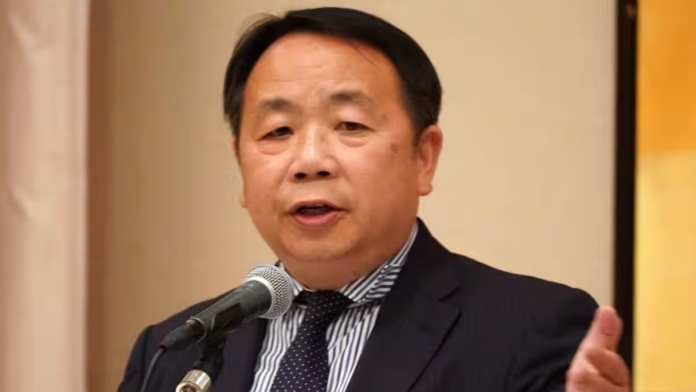China has taken a rare and dramatic step by imposing sanctions on Japanese lawmaker Hei Seki, also known by his Chinese name Shi Ping. The move marks the first time Beijing has directly sanctioned a member of Japan’s parliament, signaling rising tensions between the two powerful Asian nations.
Seki, a China-born naturalized Japanese citizen, has been openly critical of China for years. Beijing accused him of spreading false information about sensitive issues such as Taiwan and the disputed islands known as the Senkaku Islands in Japan and Diaoyu Islands in China — a small group of uninhabited islands in the East China Sea claimed by both countries and considered important for fishing and potential oil and gas reserves. The Chinese government also raised objections to his visits to the controversial Yasukuni Shrine, which honors Japan’s war dead, including convicted World War II war criminals.
China’s sanctions include banning Seki and his family from entering China, including Hong Kong and Macau. Any assets he might hold in China are frozen, and Chinese firms and individuals are barred from engaging in business with him.
China to impose tariffs of up to 78.2% on U.S. optical fibre imports
Sharp Criticism Over Taiwan and Disputed Islands
The Chinese Ministry of Foreign Affairs said Seki has long interfered in China’s internal affairs. Beijing stated that his comments on Taiwan, the Senkaku/Diaoyu Islands, and other sensitive regions violate China’s sovereignty.
China also criticized Seki’s visit to the Yasukuni Shrine. Built in 1869, the shrine honors Japanese soldiers who died in wars since the Meiji restoration, including 14 convicted World War II war criminals. Beijing views visits to the shrine as a denial of Japan’s full acknowledgment of its wartime actions, making the visits highly controversial.
Seki responded by calling the sanctions “an honor” and said they would not affect him, noting that he has no assets in China and does not plan to travel there. Japan’s Ministry of Foreign Affairs confirmed that there is no precedent for a member of parliament being sanctioned by China.
A Rare Diplomatic Move
Beijing’s action comes at a time when relations between Japan and China are already tense. The timing coincides with China celebrating the 80th anniversary of its victory over Japan in World War II. Events related to this anniversary often heighten historical and political sensitivities between the two nations.
Tariffs on Japanese autos cut to 15% under new Trump executive order
China has previously sanctioned politicians from other countries, including former U.S. Senator Marco Rubio and former UK Conservative Party leader Iain Duncan Smith, for comments on topics such as Xinjiang, Hong Kong, and Taiwan. This move fits a pattern of China responding strongly to international criticism from foreign lawmakers.
The sanctions not only restrict Seki’s personal freedoms but also block business and financial connections with Chinese entities. Experts say this kind of measure sends a strong political message.
Seki is a member of the right-leaning Japan Innovation Party. He has advocated for stronger policies on China and tighter immigration controls. Born in China and a graduate of Peking University, he later became a naturalized Japanese citizen. Hei Seki serves in the House of Councillors — the upper house of Japan’s parliament — part of the National Diet, Japan’s national legislature — where he helps make national laws and oversee government policies. His outspoken stance on China has made him a prominent critic in Japan’s political landscape.
The sanctions are effective immediately. They include the freezing of movable and immovable properties, barring transactions with Chinese organizations or individuals, and denying visas for Seki and his immediate family.
This unprecedented move highlights the delicate balance between diplomatic relations and political expression, especially in the Asia-Pacific region.


